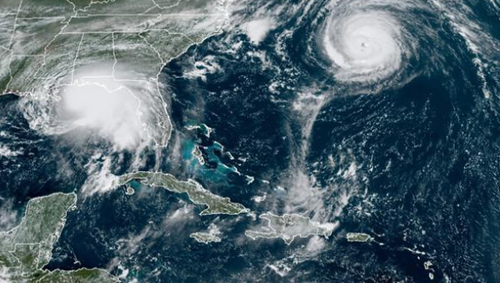
If you blinked, you may not have noticed "the science" changing on a key issue yet again.
This time, it's the issue of hurricanes and what causes them.
As any "woke" environmentalist or climate activist will tell you, man made climate change/global warming is definitely the sole, if not major driving cause behind hurricanes occurring with increased frequency and in larger sizes.
Except for one little thing: The National Oceanic and Atmospheric Administration just found from a new study that cleaner air is actually brewing more hurricanes in the Atlantic, according to a new AP article.
The new study "links changes in regionalized air pollution across the globe to storm activity going both up and down" and found that a 50% decrease in pollution particles and droplets in Europe and the U.S. is linked to a 33% increase in Atlantic storm formation over the past couple of decades.
Got that? Cleaner air, more hurricanes, in the Atlantic. In the Pacific, the opposite is happening: more pollution and fewer tycoons.
NOAA hurricane scientist Hiroyuki Murakami backed up the findings with computer simulations. Murakami found that previous thoughts on aerosol pollution cooling the air were accurate and showed a direct link to hurricane formation. Hurricanes need warm water, warmed by the air, for fuel.
Aerosol pollution peaked around 1980, the report says, and has been falling since. This means that cooling that masked some greenhouse gas warming is going away and sea surface temperatures are again rising. It has also pushed the jet stream north, the report says.
Climate and hurricane scientist Jim Kossin told AP: “That’s why the Atlantic has gone pretty much crazy since the mid-90s and why it was so quiet in the 70s and 80s." He said the aerosol pollution “gave a lot of people in the 70s and 80s a break, but we’re all paying for it now.”
AP continued:
While aerosol cooling is maybe half to one-third smaller than the warming from greenhouse gases, it is about twice as effective in reducing tropical cyclone intensity compared to warming increasing it, said Columbia University climate scientist Adam Sobel, who wasn’t part of the study. As aerosol pollution stays at low levels in the Atlantic and greenhouse gas emissions grow, climate change’s impact on storms will increase in the future and become more prominent, Murakami said.
In the Pacific, aerosol pollution from Asian nations has gone up 50% from 1980 to 2010 and is starting to drop now. Tropical cyclone formation from 2001 to 2020 is 14% lower than 1980 to 2000, Murakami said.
Kristie Ebi, who studies health, climate and extreme weather, concluded: “Air pollution is a major killer, so reducing emissions is critical no matter what happens with the number of cyclones.”
If you blinked, you may not have noticed “the science” changing on a key issue yet again.
This time, it’s the issue of hurricanes and what causes them.
As any “woke” environmentalist or climate activist will tell you, man made climate change/global warming is definitely the sole, if not major driving cause behind hurricanes occurring with increased frequency and in larger sizes.
Except for one little thing: The National Oceanic and Atmospheric Administration just found from a new study that cleaner air is actually brewing more hurricanes in the Atlantic, according to a new AP article.
The new study “links changes in regionalized air pollution across the globe to storm activity going both up and down” and found that a 50% decrease in pollution particles and droplets in Europe and the U.S. is linked to a 33% increase in Atlantic storm formation over the past couple of decades.
Got that? Cleaner air, more hurricanes, in the Atlantic. In the Pacific, the opposite is happening: more pollution and fewer tycoons.
NOAA hurricane scientist Hiroyuki Murakami backed up the findings with computer simulations. Murakami found that previous thoughts on aerosol pollution cooling the air were accurate and showed a direct link to hurricane formation. Hurricanes need warm water, warmed by the air, for fuel.
Aerosol pollution peaked around 1980, the report says, and has been falling since. This means that cooling that masked some greenhouse gas warming is going away and sea surface temperatures are again rising. It has also pushed the jet stream north, the report says.
Climate and hurricane scientist Jim Kossin told AP: “That’s why the Atlantic has gone pretty much crazy since the mid-90s and why it was so quiet in the 70s and 80s.” He said the aerosol pollution “gave a lot of people in the 70s and 80s a break, but we’re all paying for it now.”
AP continued:
While aerosol cooling is maybe half to one-third smaller than the warming from greenhouse gases, it is about twice as effective in reducing tropical cyclone intensity compared to warming increasing it, said Columbia University climate scientist Adam Sobel, who wasn’t part of the study. As aerosol pollution stays at low levels in the Atlantic and greenhouse gas emissions grow, climate change’s impact on storms will increase in the future and become more prominent, Murakami said.
In the Pacific, aerosol pollution from Asian nations has gone up 50% from 1980 to 2010 and is starting to drop now. Tropical cyclone formation from 2001 to 2020 is 14% lower than 1980 to 2000, Murakami said.
Kristie Ebi, who studies health, climate and extreme weather, concluded: “Air pollution is a major killer, so reducing emissions is critical no matter what happens with the number of cyclones.”





